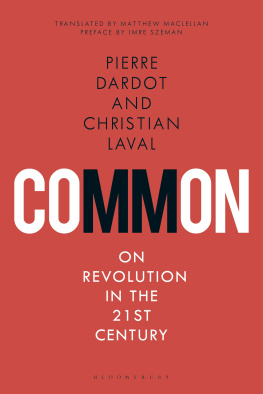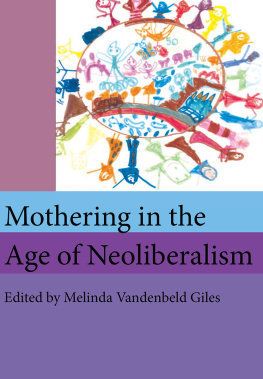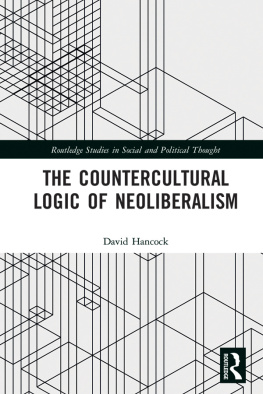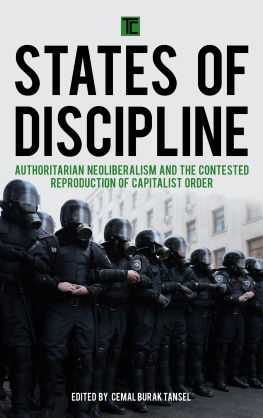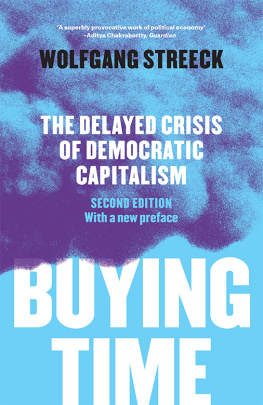Contents

Never-Ending
Nightmare
Never-Ending
Nightmare
The Neoliberal Assault
on Democracy
Pierre Dardot and
Christian Laval
Translated by
Gregory Elliott


This work was published with the help of the French
Ministry of Culture Centre national du livre
Ouvrage publi avec le concours du Ministre franais
charg de la culture Centre national du livre
Cet ouvrage publi dans le cadre du programme daide la publication bnficie
du soutien du Ministre des Affaires Etrangres et du Service Culturel de
lAmbassade de France reprsent aux Etats-Unis. This work received support
from the French Ministry of Foreign Affairs and the Cultural Services of the French
Embassy in the United States through their publishing assistance program.
First published in English by Verso 2019
First published as Ce cauchemar qui nen finit pas: Comment le
nolibralisme dfait la dmocratie Editions La Dcouverte 2016
Translation Gregory Elliott 2019
All rights reserved
The moral rights of the authors have been asserted
1 3 5 7 9 10 8 6 4 2
Verso
UK: 6 Meard Street, London W1F 0EG
US: 20 Jay Street, Suite 1010, Brooklyn, NY 11201
versobooks.com
Verso is the imprint of New Left Books
ISBN-13: 978-1-78663-474-0 (HB)
ISBN-13: 978-1-78663-476-4 (US EBK)
ISBN-13: 978-1-78663-475-7 (UK EBK)
British Library Cataloguing in Publication Data
A catalogue record for this book is available from the British Library
Library of Congress Cataloging-in-Publication Data
A catalog record for this book is available from the Library of Congress
Typeset in Fournier by MJ & N Gavan, Truro, Cornwall
Printed in the UK by CPI Mackays
Immediately afterwards, a young man in a suit came in and installed himself in the middle of the room and made a speech. No one was listening and he wasnt addressing anyone. We had to adapt to changing times, yes, to progress, and progress wasnt any old thing, but could be measured, was profitability. Innovation was important, everyone was responsible, everyone had to find a role, a style, and people mustnt stay behind, indulge in retrograde ideas and behaviour. Challenges, competition these must be confronted. We were not the only ones in the market and wed just have to do the best we could.
Leslie Kaplan, Mathias et la Rvolution
Contents
Preface to the English Edition:
Anatomy of the New Neoliberalism
Over the last decade or so, the end of liberalism has regularly been announced: the global financial crisis of 2008 was presented as the last spasm in its death agony; next was the turn of the Greek crisis in Europe (until July 2015 at least), not to mention the thunderclap of Donald Trumps election in the USA in November 2016, following the Brexit referendum result in June 2016. The fact that Britain and the US, homelands of neoliberalism in the time of Thatcher and Reagan, seemed to be repudiating it, in an abrupt nationalist reaction, was symbolically striking. Since then, in October 2018, we have had the election of Jair Bolsonaro in Brazil, promising a return to dictatorship and the implementation of a neoliberal programme of a violence and scale comparable to that of Pinochet and his Chicago boys. Not only has neoliberalism survived as a system of power, but it has been strengthened. This singular radicalization is what we need to understand, and it entails appreciating the simultaneously plastic and plural character of neoliberalism. But we must go even further and grasp the meaning of the current changes in neoliberalism in other words, the specificity of what we call the new neoliberalism.
Crisis as a Mode of Government
Let us first recall what the concept of neoliberalism involves, for it loses much of its pertinence when it is employed in a confused way, which it often is. It does not simply concern monetarist or austerity economic policies, or the commodification of social relations, or the dictatorship of financial markets. More fundamentally, it involves a political rationality that has become global, which consists in government imposing the logic of capital in the economy, but also in society and the state itself, to the point of making it the form of subjectivity and the norm of existence. A radical project, a revolutionary one even, neoliberalism is therefore not to be confused with a conservatism content to reproduce established inegalitarian structures. Through the mechanism of international relations of competition and domination, through the mediation of major organizations of global governance (IMF, World Bank, EU, and so on), this mode of government has over time become a veritable world system of power governed by the imperative of self-preservation.
What characterizes this mode of government is that it is fuelled and radicalized by its own crises. Neoliberalism is sustained and strengthened because it governs through crisis. Since the 1970s, neoliberalism has in fact been nurtured by the economic and social crises it generates. Its response is unvarying: rather than questioning the logic that prompted them, this logic must be extended and its indefinite reinforcement pursued. If austerity creates fiscal deficits, a supplementary dose is required. If competition destroys the industrial fabric or lays waste to regions, more of it must be introduced between firms, regions, cities. If public services are not fulfilling their mission, the latter must be voided of any meaning and those services deprived of resources. If tax reductions for the wealthy or corporations do not yield the anticipated results, they must be amplified, and so on and so forth. Obviously, government through crisis is possible only because neoliberalism has become systemic. Economic crises like that of 2008 are interpreted in the systems terms and elicit responses compatible with it. The absence of any alternative is not simply an expression of intellectual dogmatism, but the manifestation of a systemic modus operandi on a global scale. Thanks to globalization and/or by strengthening the European Union, states have put in place rules and constraints that lead them to react in conformity with the system.
But a more recent development, which definitely warrants attention, is that neoliberalism now feeds off the negative reactions it provokes politically, that it is strengthened by the very political hostility it fans. We are living through a metamorphosis of neoliberalism and a very dangerous phenomenon it is. Neoliberalism no longer needs its liberal or democratic image, as in the good old days of what must now be called classical neoliberalism. This image has itself become an obstacle to its domination. And this is possible because neoliberal government has no hesitation instrumentalizing the resentment of a broad section of the population suffering a lack of national identity and state protection, directing them against scapegoats. In the past, neoliberalism was often associated with openness, progress, individual liberties, and the rule of law. Today, it is conjugated with the closure of borders, the erection of walls, the cult of the nation and state sovereignty, and a campaign against human rights, which are accused of endangering security. How has this metamorphosis of neoliberalism come about?
Trumpism and Fascism
Trump unquestionably represents a significant development in the history of global neoliberalism. This mutation does not only concern the US. It affects all those governments, increasingly numerous, which exhibit nationalist, authoritarian and xenophobic tendencies, to the point of accepting the reference to fascism, as in the case of Matteo Salvini in Italy, or military dictatorship, as with Bolsonaro. The key thing is to appreciate that such governments in no way challenge neoliberalism as a mode of power. Quite the reverse, they lighten the tax burden on the wealthiest, reduce social benefits, and speed up deregulation, particularly in financial or ecological matters. These authoritarian governments, of which the Extreme Right is increasingly a component, in reality accept the absolutist, hyper-authoritarian character of neoliberalism.


